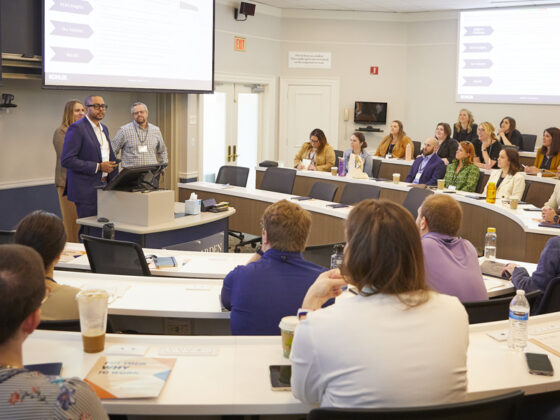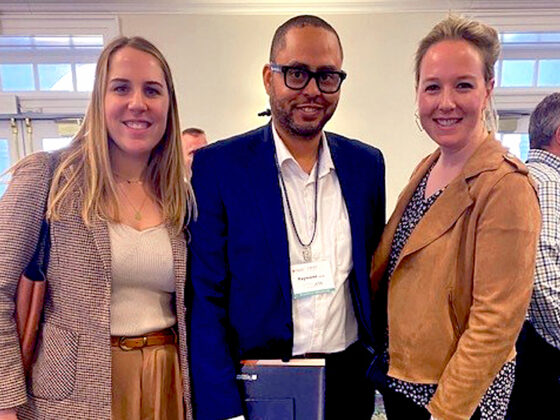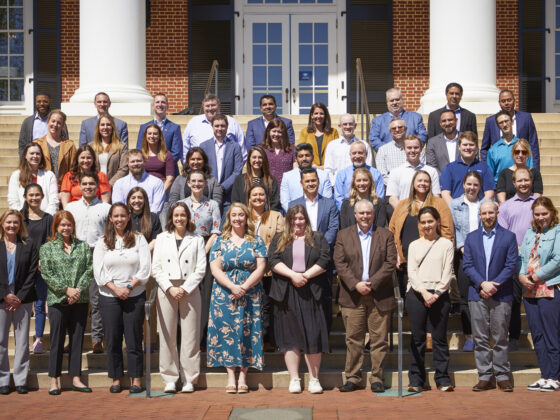How does a global leader like Kohler prioritize learning to drive significant business results? Join us for an insightful Q&A with Jeremy Richards, Senior Leadership Development Manager at Kohler Co., to uncover their strategies. Discover how Kohler, in partnership with Darden Executive Education & Lifelong Learning (EELL), aligns its Kohler Capability Accelerator (KCA) program with overarching business objectives and leverages applied learning projects to achieve measurable impact and broad organizational reach.
Kohler is a global leading manufacturing organization founded in 1873 whose mission is to help people live gracious, healthy, and sustainable lives. Our Chief Client Officer, Devin Bigoness engaged with Jeremy for this edition of Darden EELL Client Corner.
Devin: Thank you, Jeremy for your participation in this edition of Darden EELL Client Corner. In your role at Kohler, you have implemented solutions that both drive learning/business impact and reach scale. From your perspective what are the keys to doing both of those things?
Jeremy: We always start with the business needs at the highest levels of leadership. Kohler thrives on setting ambitious goals and owning them, and that philosophy cascades through every level of the business and supporting teams. Since these goals are ambitious, there is inherently a gap between current accomplishments, skills, and strategies to get us to that next level and beyond. That’s where we start to isolate the broad skill categories identified in the Kohler Capability Accelerator, such as performance marketing or data analytics.
In our needs analysis, the Darden team has been instrumental in connecting with the Kohler leaders driving these business initiatives who can help us drill down on these skill development needs and learning objectives.
From there, we want a clear throughline and visibility at all levels of leadership and to the individuals or teams who own the projects that roll up to support the business goals. That’s where the scale first emerges, as skill categories aligned with broad business needs. The managers and participants in KCA then look at their current scope of commitments, consider the additional capability they will have as they complete the coursework, and extend their existing goals as stretch projects that would only be possible through a program like KCA.
Devin: Many of our organizational clients in learning and development grapple with the ROI of potential programs which could be at the individual, function or organizational level. Kohler has worked to be able to create business impact across multiple metrics, but one primarily has been through the use of advancing applied business projects. Can you give more detail on how you and Kohler measure the impact of the Kohler Capability Accelerator program?
Jeremy: We set these expectations at the launch of each cohort. KCA exists in support of the business, not vice versa, and they should approach each lesson, lecture, or assignment with application in mind. While there will always be some ambiguity tracking exact causation, the KCA participants have been diligent in evaluating their previous benchmarks, considering the stretch goal metrics unique to KCA, and reporting or projecting the profit and/or cost savings from those projects. As one Kohler leader put it: “Even if the actual ROI were 2% of what we’re projecting, KCA would be a success in what it brings back to the business.” We also acknowledge the inherent value of the knowledge, skills, connections, and career growth of the program independent of financial results. Seeing this level of return has made KCA a surefire investment in the future of our workforce.
Devin: KCA utilizes multiple learning methodologies including manager engagement, asynchronous content, business projects, in-person celebration workshops among others. Are there key guidelines or suggestions you have on how to learn from your experiences to design learning solutions with embedded technologies?
Jeremy: You mention manager engagement first, which I’ve always seen as the cornerstone of learning success. In my two decades in corporate training across different organizations, one constant remains: If leadership were to step back or give conflicting priorities about learning over other deliverables, even the best program would falter. Fortunately, Kohler’s leadership has an unprecedented level of commitment to the learning, development, and growth of our associates, so that sets the stage for any learning modality.
Darden’s brilliant team could explain this better than I could, but I see the different modes of learning as part of a coherent ecosystem. Again, the projects remain at the center and as a driving force for the learning and business results. The asynchronous content, then, grants us flexibility for associates learning and working across the globe. The dynamic live lectures from Darden’s faculty always engage and inspire KCA participants, also giving them regular touchpoints with their cohort. Finally, the annual KCA graduation is a highlight, as we see the culmination of the projects, the energy of the gathered cohorts, the presence and support of Kohler’s senior leaders, and the insightful panel discussions from the Darden faculty. Seeing this all come together in previous years at the UVA grounds was thrilling, and we are looking forward to bringing the KCA graduation to Kohler for the first time this May.
Devin: You published a book in 2023 titled The Accomplished Creative: Overcome Imposter Syndrome, Forge Courage, and Tap Into Limitless Creativity, which talks about some of your insights on leadership development and unleashing creativity in yourself and organization. How have you built from these book insights and underlying framework to create impact as a learning professional at Kohler and previous organizations?
Jeremy: The book isn’t largely about business applications as much as personal development, though it’s all connected. The topics I researched and wrote about come up most frequently in my work at Kohler as an occasional executive coach or mentor. Research tells us that over 70% of adults struggle with imposter syndrome at some point in their lives, and that statistic alone is a reminder that you’re not alone.
Bringing it back to KCA, I’m constantly in awe of the transformation I see in associates who start the program unsure of what they are getting into or what impact their project will make, only to find that the blend of learning, community, accelerated challenges, and innovation propel them to create some of the most impressive projects I’ve ever seen. That’s the hallmark of KCA: Business value and innovation driven by personal and professional growth.
For more information on Kohler and how they focus on the impact of capability development at scale, check out our August 2023 article.








